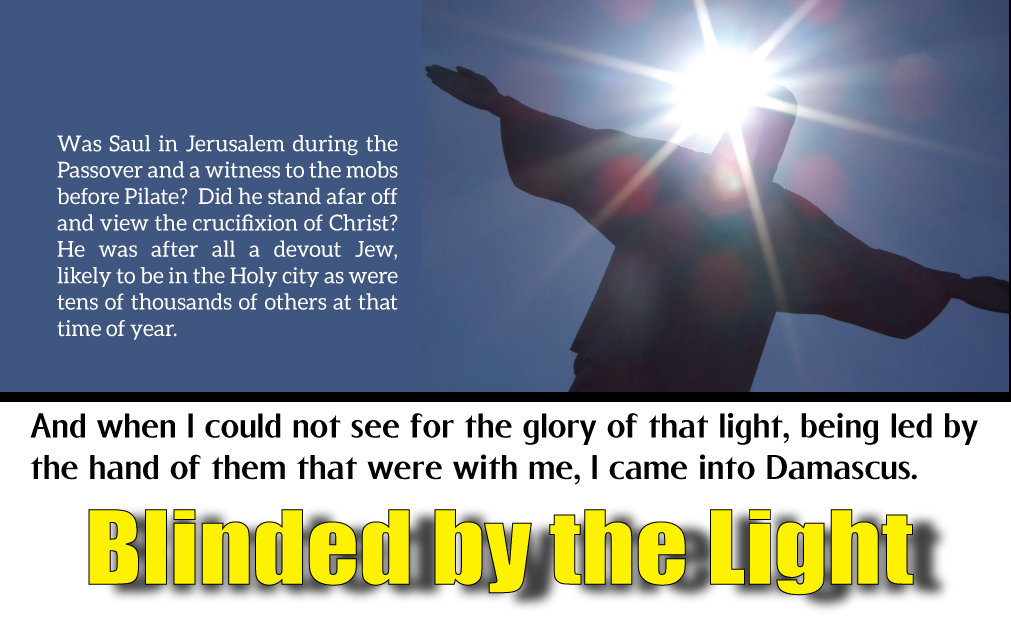
ox∑y∑mo∑ron n. A rhetorical figure in which incongruous or contradictory terms are combined, as in a deafening silence and a mournful optimist.
Saul of Tarsus was a powerful man among the Jewish religious leaders of his day. In fact, he describes himself thusly: Phl 3:5 Circumcised the eighth day, of the stock of Israel, [of] the tribe of Benjamin, an Hebrew of the Hebrews; as touching the law, a Pharisee; 3:6 Concerning zeal, persecuting the church; touching the righteousness which is in the law, blameless.
Act 22:3 I am verily a man [which am] a Jew, born in Tarsus, [a city] in Cilicia, yet brought up in this city at the feet of Gamaliel, [and] taught according to the perfect manner of the law of the fathers, and was zealous toward God, as ye all are this day.
His zeal was unmatched in the persecution of the early church. Well versed in the law and the tradition of the fathers, Saul combined all of these things to obtain letters of authority from the Chief priests. Act 22:19 And I said, Lord, they know that I imprisoned and beat in every synagogue them that believed on thee: 22:20 And when the blood of thy martyr Stephen was shed, I also was standing by, and consenting unto his death, and kept the raiment of them that slew him.
Was Saul in Jerusalem during the Passover and a witness to the mobs before Pilate? Did he stand afar off and view the crucifixion of Christ? He was after all a devout Jew, likely to be in the Holy city as were tens of thousands of others at that time of year. Jerusalem was his adopted city.
As far as the church was concerned, Saul was the most dangerous man in all of Israel. He had not only the skill and experience of beating and imprisoning believers, he quickly obtained wider authority. Act 9:1 And Saul, yet breathing out threatenings and slaughter against the disciples of the Lord, went unto the high priest, Act 9:2 And desired of him letters to Damascus to the synagogues, that if he found any of this way, whether they were men or women, he might bring them bound unto Jerusalem.
Act 9:3 And as he journeyed, he came near Damascus: and suddenly there shined round about him a light from heaven: 9:4 And he fell to the earth, and heard a voice saying unto him, Saul, Saul, why persecutest thou me? Act 9:5 And he said, Who art thou, Lord? And the Lord said, I am Jesus whom thou persecutest: [it is] hard for thee to kick against the pricks.
Oxen were moved and guided by a device called an ox goad. Many describe it as a farming implement, but itís also mentioned in scripture as the weapon that killed 600. It was a long pole with several metal pointed spears (pricks) in a bunch at its end. Placed at the back of the leg of the ox or cattle, much as we might use a cattle prod today, it kept the animals from backing up, forcing them to continue forward. As it applied sharp pointed pressure to the back of the leg, it was nearly impossible to kick against it.
Blinded by the light. Light brings darkness. Saul went instantly from being the most powerful man in Judea to the most helpless. Can you imagine what it must be like to be suddenly blind? Unable to take more than a step in any direction for fear of falling into a ditch, stumbling against a rock, falling into a body of water, or crossing the path of a quiet serpent? Quickly subdued, Paul now had to turn unto the men he commanded to beg for assistance. Act 22:11 And when I could not see for the glory of that light, being led by the hand of them that were with me, I came into Damascus.
Act 9:6 And he trembling and astonished said, Lord, what wilt thou have me to do? And the Lord [said] unto him, Arise, and go into the city, and it shall be told thee what thou must do. Act 9:7 And the men which journeyed with him stood speechless, hearing a voice, but seeing no man. They stood speechless. A newly blind Saul must have had to cry out in panic for them to help him. Act 9:8 And Saul arose from the earth; and when his eyes were opened, he saw no man: but they led him by the hand, and brought [him] into Damascus. Act 9:9 And he was three days without sight, and neither did eat nor drink.
And for three days, he probably didnít move. Three days and nights in a dark location, thatís an interesting scenario. Saul either sat in a chair or lay on a bed in a strange environment, unable to see, and not knowing what was at his left hand or his right. All he saw was his own darkness. The light that blinded him was also the one showing him his very depravity. How poetic for a man to be cast down from his lofty position by the very one he was persecuting. For three days and nights, a blind, weary Saul cried, prayed, and saw every sin he had ever committed.
Act 9:10 And there was a certain disciple at Damascus, named Ananias; and to him said the Lord in a vision, Ananias. And he said, Behold, I [am here], Lord. Act 9:11 And the Lord [said] unto him, Arise, and go into the street which is called Straight, (How fitting the chief of sinners be put on the straight street) and enquire in the house of Judas for (house of Judas Ė that puts Saulís treachery against Jesus in perspective) [one] called Saul, of Tarsus: for, behold, he prayeth, Behold, he prayeth. Indeed. This self righteous man, Pharisee of Pharisees, probably truly prayed for the first time in his life. Praying now to the very Christ he battled against hours earlier. Isnít that our case?
But soon, prayers about sin, depravity and current conditions give way to prayer with the Spirit, and some understanding begins to come to Saul. The light that brought him darkness Ė and brought his darkness to light, now is instructing, healing, imparting grace, wisdom and mercy and bringing life and immortality to light. The light that shined round about at noonday and brought Saul to the earth now shines from the inside out.
Act 9:12 And hath seen in a vision a man named Ananias coming in, and putting [his] hand on him, that he might receive his sight. Act 9:13 Then Ananias answered, (Lord, you donít know this man Ė heís evil-- heíll harm me!) Lord, I have heard by many of this man, how much evil he hath done to thy saints at Jerusalem: Act 9:14 And here he hath authority from the chief priests to bind all that call on thy name. Have we ever considered the response of Ananias? Speaking with the creator of the universe, telling Him he was afraid of what Saul might do unto him!!? Even as the Lord has told him of Saulís vision and what is to come to pass, he still shows a fear and lack of faith. Act 9:15 But the Lord said unto him, Go thy way: for he is a chosen vessel unto me, to bear my name before the Gentiles, and kings, and the children of Israel: Act 9:16 For I will shew him how great things he must suffer for my name's sake. Act 9:17 And Ananias went his way, and entered into the house; and putting his hands on him said, Brother Saul, the Lord, [even] Jesus, that appeared unto thee in the way as thou camest, hath sent me, that thou mightest receive thy sight, and be filled with the Holy Ghost.
Act 9:18 And immediately there fell from his eyes as it had been scales: and he received sight forthwith, and arose, and was baptized. Saulís experience was sufficient to convince him he was not only dealing with the Lord, but had been dealt with by the Lord. Immediately he set about to show the answer of a good conscience by water baptism. Saul wasnít showing his conscience was clear, but understood the good conscience placed in him by the Holy Spirit required answer.
Act 9:19 And when he had received meat, he was strengthened. Then was Saul certain days with the disciples which were at Damascus. Our strength comes from the meat of the gospel. Saul had received instruction from God and had it confirmed by Ananias. Now he was ready to show forth the light that illuminated him. Act 9:20 And straightway he preached Christ in the synagogues, that he is the Son of God. Act 9:21 But all that heard [him] were amazed, and said; Is not this he that destroyed them which called on this name in Jerusalem, and came hither for that intent, that he might bring them bound unto the chief priests? Act 9:22 But Saul increased the more in strength, and confounded the Jews which dwelt at Damascus, proving that this is very Christ.
Paul thought he had perfect light on this new Christian sect that was causing the Jews so much trouble. The true perfect light blinded him, and then opened his eyes. We all sing the line in Amazing Grace I once was blind, but now I see, but Paul was blinded and given sight to see and understand his depravity in a new light and with those eyes, seeing his own sin, was able to explain to us how clearly God sees our sin.
Brother Royce Ellis
|
|

